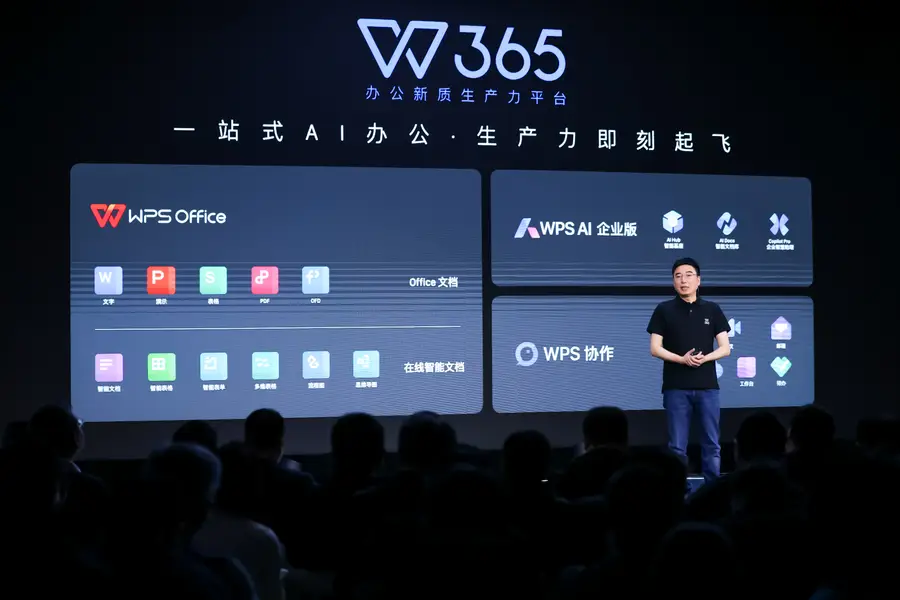Beijing software pivot puts Kingsoft in focus. But can it deliver?

A government announcement on a document using the company’s word processing program stirred expectation for accelerated import substitution in software systems
Key Takeaways:
- The Chinese government’s use of Kingsoft word processing software on a key recent document fueled a rally for shares of China’s answer to Microsoft Office
- Despite import-substitution tailwinds and bullish targets, Kingsoft’s penetration among enterprises lags, with 66% of its revenue still coming from individual users
By Xia Fei
China’s growing rare-earth export controls unveiled earlier this month are refueling concerns that a fragile trade truce with the U.S. is unraveling. But while that message was quite strong, some investors focused instead on the more subtle message of how Beijing’s latest bold declaration was delivered over the actual content.
Instead of attaching documents created by Microsoft’s PDF or DOCX formats on its website as usual, China’s Commerce Ministry created its Oct. 9 rare earths announcement using a file in WPS, a free word-processor developed by Kingsoft Corp. Ltd. (3888.HK; 688111.SH), widely viewed as China’s answer to Microsoft’s (MSFT.US) Office suite.
While never formally confirmed as new policy, the quiet shift would mark another step in Beijing’s accelerating efforts to achieve tech self-reliance and preempt future blows created by U.S. export bans on American software. An internal document released in September 2022 by SASAC, which oversees all centrally administered state-owned enterprises, showed the agency is requiring all companies under its supervision to replace foreign IT systems with domestic ones by 2027.
Still, it remains to be seen whether the Chinese government will concurrently replace more foreign software with domestic products.
Kingsoft’s Shanghai- and Hong Kong-listed shares surged as much as 18% on Oct. 13, though both have given back all those gains since then. The Shanghai stock has been a decent but far from stellar performer this year, up 11.6% year-to-date, lagging a 17.7% jump for the Shanghai Composite Index. The Hong Kong stock is an outright laggard, down 6.8% this year, even as the benchmark Hang Seng Index has jumped 29% over that time.
Spat over software
The short-lived rally appears to indicate that some are skeptical of the significance – if any – behind the government’s use of Kingsoft’s format in the rare earths document. The Commerce Ministry also released a statement in WPS format in August when it launched an anti-dumping probe into pea starch from Canada, and nobody paid the shift too much attention at that time.
Yet the broader trajectory appears unchanged, giving domestic firms a chance to catch up.
Foreign technology firms selling both hardware and software in China are in retreat. HP’s PC market share was down to 7% in China in this year’s first quarter, just half of the 13% for Huawei, hardly known for its computers, and a whopping 30% for Lenovo, according to Canalys.
The foreign brands are abandoning China not only as a market for selling their products, but also for developing and manufacturing them. That trend owes to a several factors, including rising costs in China and also a desire to diversify their manufacturing footprints to avoid future shocks from overreliance on a single country.
Microsoft, which derives 1.5% of its overall sales from China, quietly shuttered its AI lab in Shanghai by March and plans to relocate manufacturing of its Surface tablet PCs out of China next year, according to Nikkei Asia. Apple is making similar moves, relocating a growing amount of its manufacturing to India.
That withdrawal for manufacturing, and especially for sales, is leaving an opening for Chinese brands like Kingsoft, which could also be getting quiet assistance from the government as it tries to wean itself from reliance on foreign products.
Controlled by Lei Jun, one of China’s most prominent entrepreneurs and head of smartphone giant Xiaomi (1810.HK), Kingsoft is among the leading beneficiaries from China’s “delete America” campaign. In 2022 alone, China spent 1.4 trillion yuan ($191 billion) replacing foreign hardware and software, up from 16.2%, Reuters reported
Li Yinan, director of investor relations at Kingsoft Office Software, told investors in August that the company has “actively participated in the bidding for office software among central and local governments and enterprises” for its WPS business. Previous estimates show WPS already commands about 80% of the market for office software systems among Chinese governments and state-owned firms and banks.
Analysts broadly expect that China’s accelerated import substitution campaign will provide a long-term boost for domestic software firms. They have currently set an average price target of HK$42.30 for Kingsoft’s Hong Kong shares, 34% higher than Monday’s close of HK$31.64. Three out of 12 analysts polled by Yahoo Finance gave the company a “strong buy” recommendation, while seven gave it a “buy.” But the remaining two gave it a “hold,” showing not everyone is convinced of its rosy future.
Consumer heavy
However, for Kingsoft to turn Microsoft’s retreat into a gain, it first needs to deepen its penetration among the important corporate customer segment rather than relying on individual consumers and government entities to fuel its growth.
There has been little sign of such a shift. Revenue from individual clients accounted for 65.8% of WPS’ business in the first half of 2025, generating 1.75 billion yuan ($245 million), Kingsoft’s second quarter report shows. That ratio has increased steadily from 55% in the second quarter of 2020.
By contrast, corporate clients account for the lion’s share of revenue for Microsoft’s Office services. In the first six months ending June 2025, Microsoft 365 commercial products and cloud services revenue hit $46.2 billion, while its consumer-facing products only generated $2.2 billion.
Kingsoft is growing, though not at lightning speed. Its revenue rose 10% year-on-year to 2.66 billion yuan in the first half of 2025, while its profit grew by a much slower 3.57%, partly because of a pullback in its games business. The company’s monthly active users of WPS AI, the AI assistant to office suites like Microsoft’s Copilot, grew rapidly to 29.51 million as of June 30, up from 19.68 million at the end of 2024.
Reputational risk for Kingsoft over its complex pricing and data privacy practices has also clouded its prospects. Consumers befuddled by a range of pricing schemes – from “super member Pro” to “Plus” and “Pro Max” – have complained they couldn’t convert word documents into PDF files without being charged more. This came shortly after Kingsoft apologized for a clause in its user agreement that allowed it to use WPS data for AI model training.
Kingsoft certainly seems to be sitting in a comfortable spot in the ongoing technological rift between China and the U.S., which could turbocharge its growth if more state-owned entities start using its products. But it needs to move more actively to court such customers, including taking steps to become more transparent about its business practices and expand beyond its consumer comfort zone.
To subscribe to Bamboo Works weekly free newsletter, click here





